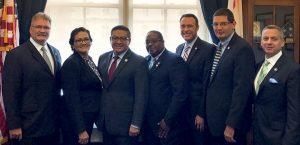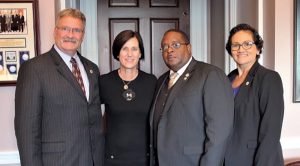Darryl Nirenberg
Partner
Eva Rigamonti
Associate
Cameron O’Brien
Legislative Assistant
Steptoe & Johnson LLP
Over the course of two days in mid-September, several members of PORAC’s Board of Directors met with more than 25 members of California’s congressional delegation, as well as with the White House and the Senate and House Judiciary Committees, to advocate for policies and principles that will help to ensure public safety.

In addition to meeting with the offices of Senators Dianne Feinstein (D) and Kamala Harris (D), PORAC also met with Representatives Ken Calvert (R-42), Mike Thompson (D-5), Salud Carbajal (D-24), Tony Cardenas (D-29), Jimmy Panetta (D-20), Paul Cook (R-8), Zoe Lofgren (D-19), Linda Sanchez (D-38), Darrell Issa (R-49), David Valadao (R-21), Jim Costa (D-16), Jeff Denham (R-10), Karen Bass (D-37), Eric Swalwell (D-15), Steve Knight (R-25), Scott Peters (D-52), Pete Aguilar (D-31), Lucille Roybal-Allard (D-40), Juan Vargas (D-51), Jerry McNerney (D-9), Doug LaMalfa (R-1), Jared Huffman (D-2), Norma Torres (D-35), Julia Brownley (D-26), Doris Matsui (D-6) and Mimi Walters (R-45). The group also had discussions with Senate Judiciary Committee Majority staff, House Judiciary Committee Minority staff and a special assistant to the president.
Members of Congress and their staffs were eager to hear PORAC’s perspective on a range of issues, because they recognize and respect the Association’s thoughtful and well-informed approach to public policy. As always, advocating for the full funding of critical state and local law enforcement programs was a top priority.

PORAC specifically urged lawmakers to maintain or increase funding for Edward Byrne Memorial Justice Assistance Grants (Byrne-JAG), the Community Oriented Policing Services (COPS) program, the High Intensity Drug Trafficking Areas (HIDTA) program, and body-worn camera grant programs — providing real-world anecdotes to demonstrate the efficacy and importance of such federal support.
PORAC explained to policymakers how these funding streams are essential for combating two of the most pressing threats to public safety in America today: opioid abuse and gang violence. Regarding each of these growing problems, PORAC offered a number of guiding principles that it believes Congress should abide by when crafting legislative solutions.
On the opioid abuse front, PORAC is advocating for a multifaceted strategy against the scourge, including enhanced border security, more fulsome social services and a crackdown on fraudulent prescribing practices by medical professionals. PORAC also encouraged policymakers to carefully consider the recommendations of the President’s Commission on Combating Drug Addiction and the Opioid Crisis, which were released this month.
On the issue of gangs and gang violence, PORAC stressed the need to increase operational coordination with state and local law enforcement agencies at the preventative, investigatory and prosecutorial levels. The group also articulated its belief that the federal government should be regularly tracking and reporting on the trends in gang presence, characteristics and behaviors so that law enforcement has a more complete understanding of the threat they face.
Above all, PORAC emphasized that lawmakers should not hesitate to use the Association’s expertise and experience as a resource on any issues impacting law enforcement — whether it be through providing testimony, data or a position on specific policy.
Trump Reverses Obama Administration’s Ban on Surplus Equipment to Cops
In late August, President Trump signed an executive order on “Restoring State, Tribal, and Local Law Enforcement’s Access to Life-Saving Equipment and Resources.” The order revokes a policy implemented by President Obama in 2015 that placed restrictions on the types of surplus military equipment that state and local law enforcement agencies are allowed to obtain from the federal government.
Former President Obama’s order halted the transfer of gear, weapons and other devices (such as explosives, battering rams, riot helmets and shields) to state and local agencies, and in many cases required local agencies to return equipment that they had received from the federal government. In fact, since Obama’s executive order, approximately 125 tracked armored vehicles, 140 grenade launchers and 1,600 bayonets have been returned to the federal government.
Trump’s executive order directs all executive departments and agencies to cease applying the previous order and “if necessary, to take prompt action to rescind any rules, regulations, guidelines, or policies implementing” it.
In announcing the reversal of policy, Attorney General Jeff Sessions said that the Obama administration’s “restrictions went too far” and that the Trump administration “will not put superficial concerns above public safety.” State and local law enforcement officials across the country have come to the defense of the surplus equipment program — also known as the 1033 Program — arguing that it provides agencies with advanced equipment that they would otherwise be unable to afford with such limited budgets. Proponents have also pointed to the various public safety applications of this equipment. During the recent flooding in Texas, for example, law enforcement deployed armored vehicles to rescue and evacuate civilians.
President Trump Signs Rapid DNA Act Into Law
Just before Congress returned from its August recess, President Trump signed into law the Rapid DNA Act of 2017. PORAC has long been a vocal supporter of this legislation, although past iterations of the bill have failed to become law, and is very pleased that this important legislation was enacted.
PORAC was encouraged to see that the California congressional delegation played a prominent role in the bill’s passage, with Senator Feinstein (D-Calif.) as the lead co-sponsor of the Senate bill (S. 139) and Representative Eric Swalwell (D-15) as the lead co-sponsor of the House bill (H.R. 510). Additional co-sponsors from California included Jackie Speier (D-14), Mark DeSaulnier (D-11) and John Garamendi (D-3).
The legislation aims to implement the use of Rapid DNA instruments — instruments that are able to derive an automated DNA profile from a DNA sample — to inform decisions about pretrial release, exonerate the innocent and prevent DNA analysis backlogs. Specifically, the law amends the DNA identification Act of 1994 by requiring the director of the Federal Bureau of Investigation (FBI) to issue standards and procedures for the use of Rapid DNA instruments and resulting DNA analyses. It also amends the DNA Analysis Backlog Elimination Act of 2000 by allowing the FBI director to waive the required analysis if DNA samples have been analyzed by means of Rapid DNA instruments.
PORAC Encouraged by Inclusion of Operation Stonegarden Funding in DHS Bill
The Department of Homeland Security (DHS) authorization bill (H.R. 2825), which authorizes funding for DHS and was passed by the House before its August recess, includes robust funding for a program that is critical to combating narcotics and human trafficking along California’s expansive coastline.
Operation Stonegarden supports enhanced cooperation and coordination among Customs and Border Protection, the United States Border Patrol, and state and local law enforcement agencies in their efforts to secure the U.S. border. Funds administered through the program are used for a range of activities that help to ensure border security, including the hiring of additional law enforcement personnel, the payment of overtime to officers working on panga smuggling investigations, and the reimbursement of travel and lodging costs associated with increasing the presence of law enforcement along the border.
PORAC appreciates that California Representative Salud Carbajal (D-24) actively advocated for Operation Stonegarden funding, explaining in a letter to the House Appropriations Committee that this federal support “is particularly important in [his] district along the Central Coast of California where we have seen an increase in small-craft smuggling of narcotics and, in some cases, humans.” H.R. 2825 authorizes $110 million for Operation Stonegarden, although the funds must still be appropriated with the passage of a funding bill.
